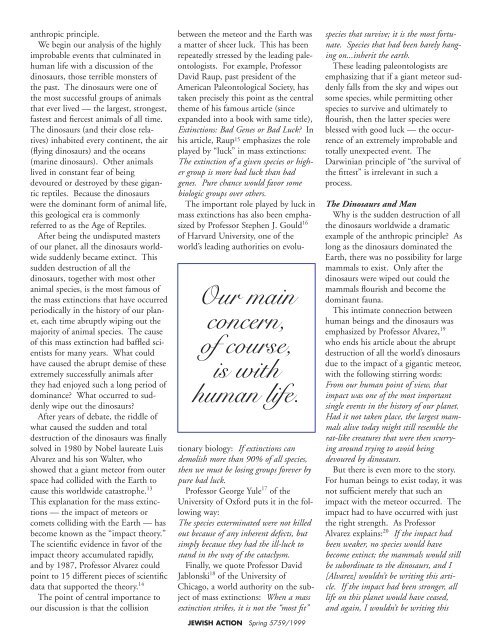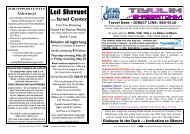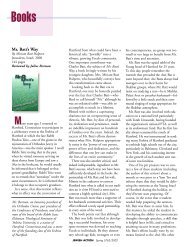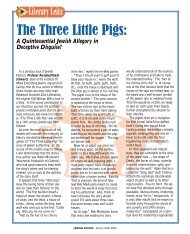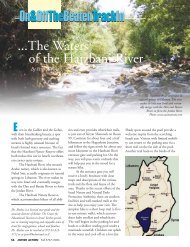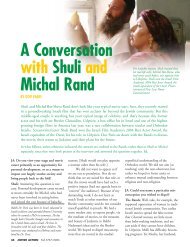The Anthropic Principle
The Anthropic Principle
The Anthropic Principle
Create successful ePaper yourself
Turn your PDF publications into a flip-book with our unique Google optimized e-Paper software.
anthropic principle.<br />
We begin our analysis of the highly<br />
improbable events that culminated in<br />
human life with a discussion of the<br />
dinosaurs, those terrible monsters of<br />
the past. <strong>The</strong> dinosaurs were one of<br />
the most successful groups of animals<br />
that ever lived — the largest, strongest,<br />
fastest and fiercest animals of all time.<br />
<strong>The</strong> dinosaurs (and their close relatives)<br />
inhabited every continent, the air<br />
(flying dinosaurs) and the oceans<br />
(marine dinosaurs). Other animals<br />
lived in constant fear of being<br />
devoured or destroyed by these gigantic<br />
reptiles. Because the dinosaurs<br />
were the dominant form of animal life,<br />
this geological era is commonly<br />
referred to as the Age of Reptiles.<br />
After being the undisputed masters<br />
of our planet, all the dinosaurs worldwide<br />
suddenly became extinct. This<br />
sudden destruction of all the<br />
dinosaurs, together with most other<br />
animal species, is the most famous of<br />
the mass extinctions that have occurred<br />
periodically in the history of our planet,<br />
each time abruptly wiping out the<br />
majority of animal species. <strong>The</strong> cause<br />
of this mass extinction had baffled scientists<br />
for many years. What could<br />
have caused the abrupt demise of these<br />
extremely successfully animals after<br />
they had enjoyed such a long period of<br />
dominance? What occurred to suddenly<br />
wipe out the dinosaurs?<br />
After years of debate, the riddle of<br />
what caused the sudden and total<br />
destruction of the dinosaurs was finally<br />
solved in 1980 by Nobel laureate Luis<br />
Alvarez and his son Walter, who<br />
showed that a giant meteor from outer<br />
space had collided with the Earth to<br />
cause this worldwide catastrophe. 13<br />
This explanation for the mass extinctions<br />
— the impact of meteors or<br />
comets colliding with the Earth — has<br />
become known as the “impact theory.”<br />
<strong>The</strong> scientific evidence in favor of the<br />
impact theory accumulated rapidly,<br />
and by 1987, Professor Alvarez could<br />
point to 15 different pieces of scientific<br />
data that supported the theory. 14<br />
<strong>The</strong> point of central importance to<br />
our discussion is that the collision<br />
Our main<br />
concern,<br />
of course,<br />
is with<br />
human life.<br />
between the meteor and the Earth was<br />
a matter of sheer luck. This has been<br />
repeatedly stressed by the leading paleontologists.<br />
For example, Professor<br />
David Raup, past president of the<br />
American Paleontological Society, has<br />
taken precisely this point as the central<br />
theme of his famous article (since<br />
expanded into a book with same title),<br />
Extinctions: Bad Genes or Bad Luck? In<br />
his article, Raup 15 emphasizes the role<br />
played by “luck” in mass extinctions:<br />
<strong>The</strong> extinction of a given species or higher<br />
group is more bad luck than bad<br />
genes. Pure chance would favor some<br />
biologic groups over others.<br />
<strong>The</strong> important role played by luck in<br />
mass extinctions has also been emphasized<br />
by Professor Stephen J. Gould 16<br />
of Harvard University, one of the<br />
world’s leading authorities on evolutionary<br />
biology: If extinctions can<br />
demolish more than 90% of all species,<br />
then we must be losing groups forever by<br />
pure bad luck.<br />
Professor George Yule 17 of the<br />
University of Oxford puts it in the following<br />
way:<br />
<strong>The</strong> species exterminated were not killed<br />
out because of any inherent defects, but<br />
simply because they had the ill-luck to<br />
stand in the way of the cataclysm.<br />
Finally, we quote Professor David<br />
Jablonski 18 of the University of<br />
Chicago, a world authority on the subject<br />
of mass extinctions: When a mass<br />
extinction strikes, it is not the “most fit”<br />
JEWISH ACTION Spring 5759/1999<br />
species that survive; it is the most fortunate.<br />
Species that had been barely hanging<br />
on...inherit the earth.<br />
<strong>The</strong>se leading paleontologists are<br />
emphasizing that if a giant meteor suddenly<br />
falls from the sky and wipes out<br />
some species, while permitting other<br />
species to survive and ultimately to<br />
flourish, then the latter species were<br />
blessed with good luck — the occurrence<br />
of an extremely improbable and<br />
totally unexpected event. <strong>The</strong><br />
Darwinian principle of “the survival of<br />
the fittest” is irrelevant in such a<br />
process.<br />
<strong>The</strong> Dinosaurs and Man<br />
Why is the sudden destruction of all<br />
the dinosaurs worldwide a dramatic<br />
example of the anthropic principle? As<br />
long as the dinosaurs dominated the<br />
Earth, there was no possibility for large<br />
mammals to exist. Only after the<br />
dinosaurs were wiped out could the<br />
mammals flourish and become the<br />
dominant fauna.<br />
This intimate connection between<br />
human beings and the dinosaurs was<br />
emphasized by Professor Alvarez, 19<br />
who ends his article about the abrupt<br />
destruction of all the world’s dinosaurs<br />
due to the impact of a gigantic meteor,<br />
with the following stirring words:<br />
From our human point of view, that<br />
impact was one of the most important<br />
single events in the history of our planet.<br />
Had it not taken place, the largest mammals<br />
alive today might still resemble the<br />
rat-like creatures that were then scurrying<br />
around trying to avoid being<br />
devoured by dinosaurs.<br />
But there is even more to the story.<br />
For human beings to exist today, it was<br />
not sufficient merely that such an<br />
impact with the meteor occurred. <strong>The</strong><br />
impact had to have occurred with just<br />
the right strength. As Professor<br />
Alvarez explains: 20 If the impact had<br />
been weaker, no species would have<br />
become extinct; the mammals would still<br />
be subordinate to the dinosaurs, and I<br />
[Alvarez] wouldn’t be writing this article.<br />
If the impact had been stronger, all<br />
life on this planet would have ceased,<br />
and again, I wouldn’t be writing this


